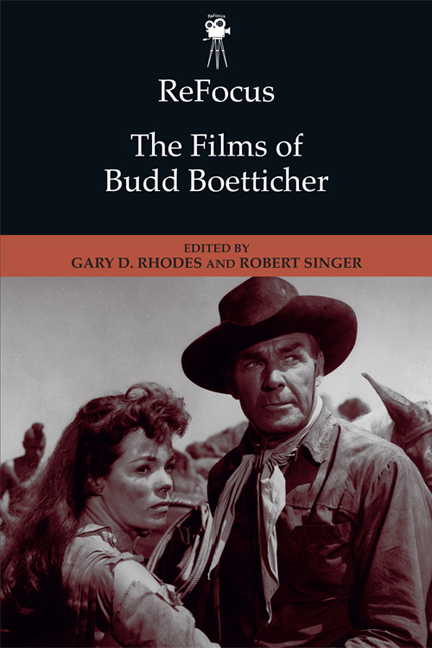Book contents
- Frontmatter
- Contents
- Notes on Contributors
- Dedication
- Introduction
- Part 1 The Non-Westerns
- Part 2 The Westerns
- Part 2 Introduction
- 7 The Ranown Cycle: Budd Boetticher's “New Look” Western Programmers in 1950s Hollywood
- 8 Framings, Motifs, and Floating Poker Games in Seven Men from Now (1956)
- 9 The Ranown Style: Mapping Textual Echoes
- 10 You Were Married, But You Never Had a Wife: The Use of Space in the Westerns of Budd Boetticher
- 11 Ideology and Boetticher's Westerns from the Late 1950s
- 12 Outlaws Without a Cause: Generational Conflict in Budd Boetticher's Ranown Cycle
- 13 The Box in the Desert: Budd Boetticher, Breaking Bad, and the Twenty-first-century Western
- Index
7 - The Ranown Cycle: Budd Boetticher's “New Look” Western Programmers in 1950s Hollywood
from Part 2 - The Westerns
Published online by Cambridge University Press: 22 December 2017
- Frontmatter
- Contents
- Notes on Contributors
- Dedication
- Introduction
- Part 1 The Non-Westerns
- Part 2 The Westerns
- Part 2 Introduction
- 7 The Ranown Cycle: Budd Boetticher's “New Look” Western Programmers in 1950s Hollywood
- 8 Framings, Motifs, and Floating Poker Games in Seven Men from Now (1956)
- 9 The Ranown Style: Mapping Textual Echoes
- 10 You Were Married, But You Never Had a Wife: The Use of Space in the Westerns of Budd Boetticher
- 11 Ideology and Boetticher's Westerns from the Late 1950s
- 12 Outlaws Without a Cause: Generational Conflict in Budd Boetticher's Ranown Cycle
- 13 The Box in the Desert: Budd Boetticher, Breaking Bad, and the Twenty-first-century Western
- Index
Summary
The Western genre witnessed an immense surge in popularity in 1950s America. Alongside a boost in the publishing of Western literature and the dominance of Western shows on television, Hollywood produced a large number Western features. These ranged from Disney's Davy Crockett: King of the Wild Frontier (1955) based on a children's television series, to star-studded, critically acclaimed contemporary Western dramas such as Giant (1956), and everything between. From 1956 to 1960, at the height of the Western boom, Budd Boetticher made a series of six medium-budget color films, starring veteran Western actor Randolph Scott. The first of these independent productions, Seven Men From Now (1956), was scripted by Burt Kennedy and produced under John Wayne's Batjac company. Following ongoing contractual negotiations between Batjac and Warner Bros., Boetticher and Scott signed a distribution deal with Columbia, where Scott recruited longtime partner and producer Harry Joe Brown. The five films that followed—The Tall T (1957), Decision at Sundown (1957), Buchanan Rides Alone (1958), Ride Lonesome (1959), and Comanche Station (1960)—were all produced in collaboration with Scott, Boetticher and Brown. Three of these films were scripted by Burt Kennedy; cinematographer Charles Lawton, Jr. worked on a similar number.
These close collaborations, as well as the consistencies in theme and style between the films, and the compressed time period in which they were produced, allow the pictures to be viewed as a coherent body of work. In this way, the films are commonly termed the “Ranown cycle” after the name of Scott and Brown's production company. The majority of these films center on the story of a lone hero, played by Scott, who becomes entangled with a group of gunmen as they journey through the wilderness. They explore the complex relationships and motivations of the characters in this isolated company, particularly the affinity and respect between hero and villain, as they head towards a final showdown. Though these films, along with Boetticher's bullfighting pictures, are generally thought of as being intrinsic to his oeuvre, they have to date received limited critical considerations. Jim Kitses’ structural auteurist evaluation has dominated appraisals with his focus on Boetticher playing out the Western genre's “rules of the game.” There thus remains room to consider the films from a more historically contextualized viewpoint to understand, on a more immediate level, how and why the films were made.
- Type
- Chapter
- Information
- ReFocus: The Films of Budd Boetticher , pp. 121 - 134Publisher: Edinburgh University PressPrint publication year: 2017



